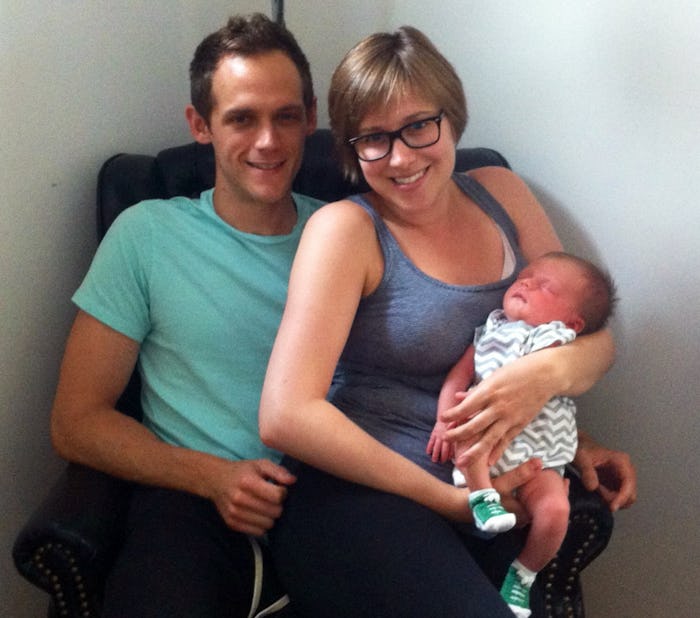Life

When We Brought Our Baby Home, My Husband Did Something Incredible
There is a lot expected of your partner when you bring your baby home from the hospital. Basically, it is the non-birthing parent's job to support in any way possible. Support tasks include but are not limited to: taking care of daily chores, cooking meals, and being on the lookout for postpartum depression or anxiety. I am lucky enough to be married to a man who is an equal partner in parenting and who did all of the things listed above and more. But there is one seemingly tiny thing my husband did when we brought our baby home that was more important than the rest: He allowed me to feel everything, every postpartum hormone and emotion. My husband didn't judge me for my postpartum emotions, and it made all the difference in my new-baby life.
They say opposites attract, and my husband and I are perfect examples of that. I wear my heart on my sleeve. There is not a moment of any day that someone cannot tell what I am thinking or feeling because it is written all over my face. He is the exact opposite. He is not expressive with his emotions and you have to know him to know his feelings. I shed tears at the drop of a hat. He is stoic in even the most upsetting of situations.
This doesn't mean he doesn't feel things. He is an incredibly caring and sensitive person. He simply expresses that sensitivity differently than I do. But that difference has certainly caused some issues in our relationship. While I want to see a reflection of my own passion and emotion on his face, sometimes that is not something he is capable of giving me. Sometimes I worry that my feelings are a burden on him, something he has to "deal with" or "handle."
To say we handled the diagnosis of our daughter's four congenital brain conditions differently would be an understatement. Around 28 weeks, our unborn daughter was diagnosed with agenesis of the corpus callosum (ACC). Doctors told us she was missing a piece of her brain, the corpus callosum. Her prognosis was unknown; she might be severely cognitively and developmentally delayed. Or she might not be. We wouldn't know until she was born. And even then her delays might not appear right away. She was also diagnosed with colpocephaly, an underdevelopment of the back of the brain that affects cognitive development; a neuronal migration disorder that could cause seizures; and septo-optic dysplasia, an underdevelopment of the optic nerve that could impair vision and affect pituitary gland function.
The day we received the diagnosis, I cried, for hours. My husband remained strong; shaken but also unshakeable. In hindsight, I think maybe he was staying that way for me. We spent the rest of my pregnancy in a scared state of limbo. And then our daughter was born, and she was fine. There was no failure to thrive. She could breathe on her own (something we'd been told might not happen). She ate enthusiastically (another thing we'd been told to prepare for her not to do). Her tone was perfect, her reflexes normal. Her geneticist and neurologist were happy, impressed even, with how well she was doing. The severity of her brain's underdevelopment paired with the "normalcy" of her first few days in hospital were a little bit miraculous.
Imagine being told your child was missing a piece of her brain. Imagine the fear that comes with those words, the heavy weight of them pressing on your heart. Imagine a doctor, an expert in their field, telling you there is no way of knowing what your child will be like when she is born, that you'll just have to wait and see. And then imagine that your child is born and she has none of the issues doctors warned you about. I imagine everyone reacts to these situations differently. But for me, I felt profound relief and happiness. Then I also felt guilt. Guilt for feeling relieved. Guilt that my daughter was "OK" while there were many others with her same diagnosis who were not. I felt fear that there was still so much that could go wrong. I felt afraid to hope that everything would end up all right. And I felt all of the same emotions postpartum mothers feel: profound exhaustion, elation at the sheer perfection of their child, incandescent happiness, and all-consuming love.
When we brought our daughter home, I know that my husband felt all those same things. But we expressed it in such different ways. His exhaustion was apparent, but I don't remember experiencing even a moment of uncertainty on his part. When I cried that I couldn't do this, be a mom, he told me quietly that I could. Not once did I feel judgment for a feeling that consumed me with guilt. There was only his unwavering belief in me and his endless support. When I was so tired from a middle of the night feeding, he came quietly into the room and took over, telling me to go to bed. And when he heard my exhausted sobs coming from our bedroom, he never once told me to calm down or that I was overreacting. He somehow knew that I just needed to cry it out and checked on me later.
What my husband allowed me to do was feel, everything, and in the way that I needed to feel it. Even if that way was different than his own. Even if the tears made him uncomfortable (and they do). Even when he had his own emotions to contend with, he put my needs first. He helped me celebrate our OK for now. He embraced my moments of terrible lows. He did the one thing that all non-birthing parents are supposed to do: he supported me in any way possible.
Check out Romper's new video series, Romper's Doula Diaries: